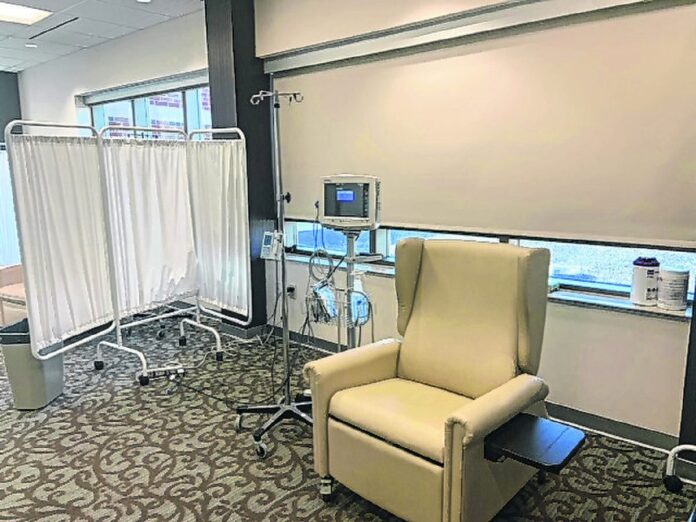
GREENFIELD — Chris Wickard tested positive for COVID-19 in late November after waking up without a sense of taste or smell — two of the virus’s symptoms.
The 49-year-old eastern Hancock County resident also developed a severe cough.
“I basically threw my back out, I was coughing so much,” he said.
[sc:text-divider text-divider-title=”Story continues below gallery” ]
Wickard has diabetes as well, which put him at a higher risk of developing a serious illness from COVID-19.
His doctor recommended he get a form of treatment for COVID-19 patients that Hancock Regional Hospital had recently started offering, which equipped him with an army of antibodies to fight off the virus.
“I don’t think I could’ve gotten over this very easily if I hadn’t,” Wickard said.
He’s one of about 260 patients so far to receive the treatment at the new clinic, which a hospital leader reports has found success over the weeks it’s been operating.
The treatment is called a monoclonal antibody infusion, and the hospital started providing them on Nov. 20. Dr. Julia Compton, president of the Hancock Physician Network, said the hospital requested it immediately upon learning the state would allow it following its emergency use authorization from the U.S. Food and Drug Administration.
“We requested a large number from the state knowing we were going to be very aggressive about setting up this clinic,” Compton said.
There aren’t a lot of treatment options for COVID-19, she continued.
“So it’s a really big deal on getting anything out there that can either slow or stop the course,” she said.
An infusion gives a patient antibodies intravenously that will fight the virus that causes COVID-19 in their system. The process takes an hour, after which the patient is monitored for an hour.
One treatment the hospital has at its disposal is made by Eli Lilly and Company and is designed to block the virus’s attachment and entry into human cells. Another is made by Regeneron and is also designed to block the virus’s attachment and entry into cells. It uses two antibodies, decreasing the chance of the virus randomly mutating to evade the blocking action of one antibody alone.
The treatments differ from a COVID-19 vaccine, Compton said, as the vaccines are designed to provide “a guidebook for your cells to create an antibody response.”
“The monoclonal antibody is different,” she continued. “It doesn’t ask your body to do anything, it just gives you a whopping dose of antibodies and says, ‘Here, go fight the virus.’”
Criteria the hospital uses to help determine whether a patient gets one of the forms of treatment include having a high risk of getting very sick from COVID-19 due to underlying health conditions; a minimum age of 12; and confirmed to have COVID-19 with mild to moderate symptoms.
The criteria also lists high-risk factors like being age 65 and older; body mass index of 35 or greater; chronic kidney disease; diabetes; a disease or treatment that suppresses one’s immune system; and other ailments.
Most patients who have been getting the treatment are 65 or older and have underlying health conditions, Compton said.
Patients can receive a treatment after their doctor orders it.
Compton said the clinic tries to see patients the same day or the day after the treatment is ordered.
“We know it works better the earlier in the process it is,” she said.
Guidance the hospital uses calls for the treatment to occur within 10 days of symptoms.
“Here, in Hancock County, we are in such a good position because we have so many rapid (COVID-19) tests that we can do,” Compton added.
The clinic calls patients the day after their treatment to check in, and patients are to check in with their doctors within a few days as well.
Compton said while data has yet to be analyzed, the success rate for the treatments at the hospital, anecdotally at least, appears to be high.
“What we’re hearing is that the majority of people will notice a difference within the first 24 to 48 hours,” she said.
Some patients have reported an ability to breathe a little better, or that their overall symptoms have improved, she continued.
“Now is that everybody? No, but again, our learning is that the sooner we can get you in the process of the disease cycle, the better the outcome is going to be,” she said.
The day after Wickard received his treatment in early December, he was able to do some work from home. Over the next two days, he felt a lot better. The following day, he was out in a barn building a wall. While he still wasn’t 100%, the following week he was.
“It made me feel a lot better, and I definitely recommend it,” he said of the treatment.
Like Compton, he encourages those who need it to get it as quickly as possible.
“If people have some of these underlying things, they really need to think about doing it early and not wait like I did,” Wickard said.
Compton said side effects of the treatment include those that can happen from any infusion, like an infection at the entry point or an allergic reaction.
Those who run the clinic are cancer center nurses, for whom antibody infusions are a regular responsibility.
The clinic can treat five to seven patients at a time and and can do 15 to 20 a day. It’s open Monday through Saturday.
Compton said the hospital’s supply-demand balance for the treatments is stable.
“With the quantity that we have and the number of patients that are coming to us, we’re able to serve everyone who needs it, which is great,” she said.




